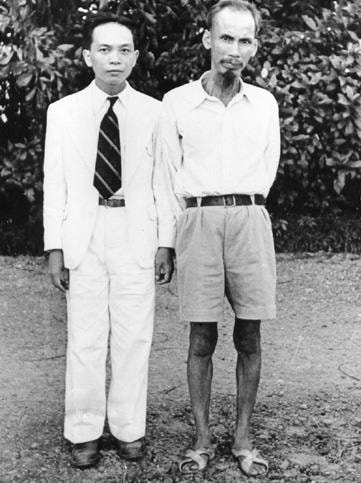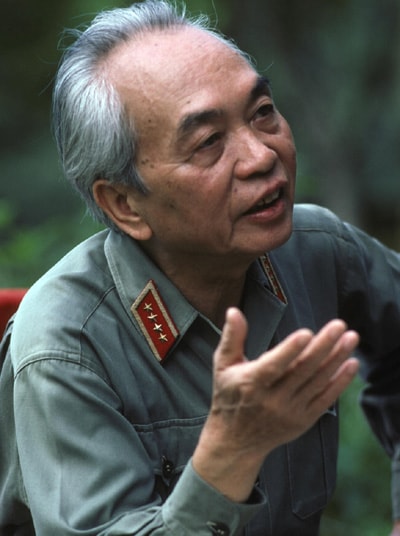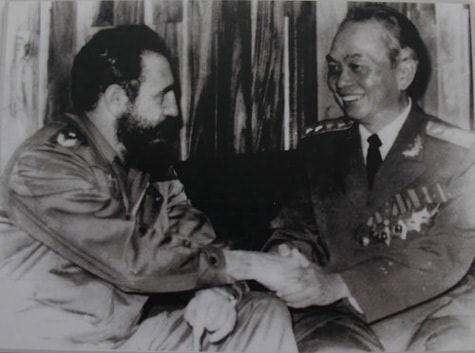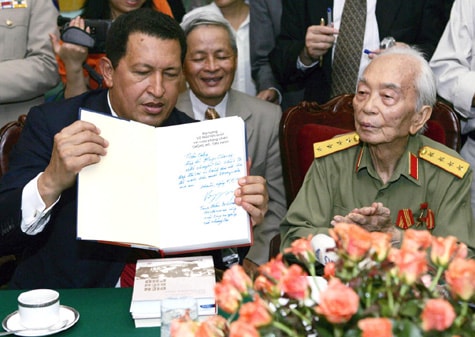American news agency talks about legendary General Vo Nguyen Giap
“Vo Nguyen Giap is a national hero whose legacy is second only to that of his teacher, the President who gave birth to the new Vietnam.”
Nicknamed a “Red Napoleon,” he rose to prominence as the commander of an army of guerrillas wearing sandals made of tires and dragging artillery piece by piece over mountains and deep ravines to encircle and crush the French army at Dien Bien Phu in 1954. This seemingly improbable victory, still studied in military schools, led not only to Vietnam’s independence but also hastened the collapse of colonialism throughout Indochina and beyond.
Mr. Vo Nguyen Giap then went on to overthrow the puppet regime in South Vietnam (established and supported by the Americans) in April 1975, reunifying the country which had been divided into two parts since 1954.
 |
| General Vo Nguyen Giap and President Ho Chi Minh at the Northern Palace in September 1945 right after the August Revolution (photo: AP) |
“No other war for national liberation was as fierce and caused as many casualties as this war,” Mr. Giap told the AP news agency in 2005 in an interview with foreign media on the eve of the 30th anniversary of the April 30 Great Victory.
“But we still fought because for Vietnam, nothing is more precious than independence and freedom,” AP quoted Mr. Vo Nguyen Giap, quoting the immortal words of President Ho Chi Minh.
General Giap remained sharp and knowledgeable about politics and current affairs until he was hospitalized. Well into his 90s, he still received world leaders, who took photos with him and received books written by Giap and autographed by the general when they visited his private home in Hanoi.
Born in 1911 in Quang Binh province, Giap became active in politics in the 1920s and worked as a journalist before joining the Indochinese Communist Party. He was briefly imprisoned in 1930 for leading anti-French protests.
In 1944, Vo Nguyen Giap, at the call of Ho Chi Minh, organized and led guerrilla forces against the occupying Japanese forces during World War II. After Japan surrendered to the Allies a year later, the Viet Minh forces continued to fight for independence from the French.
General Giap never received any formal military training. He often joked that he had graduated from a “bush” military academy.
 |
| General Giap in 1984 (photo: Getty Images) |
At the Dien Bien Phu battlefield, his Viet Minh troops surprised the elite French forces by surrounding them. Digging hundreds of kilometers of trenches, the Vietnamese dragged heavy artillery over deep mountains and high passes and gradually closed the encirclement in a fierce 55-day battle that ended with the French surrender on May 7, 1954.
“If a nation is determined to stand up, it will be very strong,” Vo Nguyen Giap told foreign journalists in 2004 ahead of the 50th anniversary of the historic campaign. “We are very proud that Vietnam was the first colony that stood up and regained independence on its own.”
This was the final event that led to the French withdrawal and the Paris Agreement that temporarily divided Vietnam into two regions.
The Vietnamese general drew on his Dien Bien Phu victory to create the Ho Chi Minh Trail, a secret jungle network that snaked through neighboring Laos and Cambodia to reinforce the southern front.
General Giap's forces won again, this time against the Americans with their sophisticated weapons and B-52 strategic bombers.
“We had to use small forces to fight big forces, and use outdated weapons to defeat modern weapons,” said Mr. Giap. “In the end, it was the human factor that decided the victory.”
 |
| General Giap received Fidel Castro |
Historian Stanley Karnow, who interviewed Vo Nguyen Giap in Hanoi in 1990, quoted him as saying: “We were not strong enough to drive half a million American troops out of our country, but that was not our aim. Our intention was to break the will of the American government to continue the war.”
“With the victory of April 30, slaves became free people,” General Giap said. “It was unbelievable.”
After the war and a number of positions, Mr. Giap retired in Hanoi, wrote memoirs and attended national ceremonies, often wearing military uniform with gold stars on the shoulder boards.
He held press conferences, reading handwritten notes, and occasionally answering questions in French, during commemorations of wartime events.
Vo Nguyen Giap kept up with world news and gave advice on the American war in Iraq in 2004. He told reporters that “any force that wants to impose its will on other peoples is bound to fail.”
General Giap received many foreign dignitaries, including his friend and comrade Fidel Castro of Cuba. In 2003, the pair sat chatting and laughing in Giap's house beneath a portrait of Vladimir Lenin.
General Giap’s former enemy, former US Secretary of Defense Robert McNamara, visited him in 1995. Mr. McNamara asked about a controversial chapter in the Vietnam War, the 1964 Gulf of Tonkin incident in which a US destroyer pretended to fire on a North Vietnamese vessel – this was the pretext for the US Congress to escalate the war in Vietnam.
During the aforementioned visit, Mr. McNamara asked General Giap what happened that night (in 1964). General Giap replied: “Absolutely nothing.”
 |
| General Vo Nguyen Giap received Venezuelan President Hugo Chavez, who greatly admired General Giap and his military art (photo taken by Reuters in 2006) |
General Giap celebrated his 100th birthday in 2011. Very weak and unable to speak, he still signed a card thanking comrades for their birthday wishes. And at that time, he continued to be updated on international and domestic news, said Colonel Nguyen Huyen, Giap's personal secretary for 35 years.
Late in life, Vo Nguyen Giap encouraged warmer relations between Vietnam and the United States, which began normalizing diplomatic relations in 1995 and have become close trading partners.
In 2000, General Giap said: “We can put the past behind us… But we cannot completely forget the past.”/.
According to vov.vn - LT






